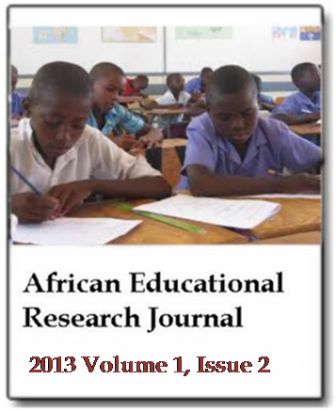Effects of two puzzle-based instructional strategies on primary school pupils’ learning outcomes in social studies in Ondo State, Nigeria
Adedoja Gloria, Abidoye James A. and Afolabi A. K.African Educational Research Journal
Published: July 1 2013
Volume 1, Issue 2
Pages 58-63
Abstract
The persistent poor achievement being recorded in Social Studies at the primary school level in Nigeria has been attributed to inadequate instructional resources and the use of lecture methods which do not promote active participation of pupils in the teaching-learning process. Most previous studies have not explored the use of Three Dimensional Puzzle-Based Strategy and Paper and Pencil Puzzle-Based Strategy especially in Social Studies classroom which encourage active pupils’ participation. This study therefore determined the effects of Three Dimensional Puzzle-Based Strategy (TDPS) and Paper and Pencil Puzzle-Based Strategy PPPS on pupils’ achievement and attitude towards Social Studies. It also determined the moderating effects of gender and school location on the dependent variables. The study adopted pretest-posttest, control group, quasi-experimental design, using a 3×2×2 factorial matrix. Two hundred and forty primary 4 pupils from six primary schools purposively selected from three Local Government Areas of Ondo State, participated in the study. Instruments used were: Social Studies Achievement Test (r = 0.82), Social Studies Attitude Questionnaire (r = 0.84), Instructional Guide on Three Dimensional Puzzle-Based Strategy, Instructional Guide on Paper and Pencil Puzzle-Based Strategy, and Instructional Guide on Modified Conventional Teaching Method. Four hypotheses were generated and tested at 0.05 level of significance. Data were analysed using Analysis of covariance and Scheffe’s post hoc test. Treatment had significant main effect on pupils’ post achievement score in Social Studies (F(2,227) = 112.203; p<0.05). Pupils exposed to TDPS attained highest post achievement mean score (x = 13.103) in social studies, followed by PPPS group (x = 8.841) and control group (x = 5.882). Also, there was significant effect of school location on pupils’ achievement in Social Studies (F(1,227) = 222.203; p<0.05). Pupils in urban schools had highest achievement mean score (x = 12.093) than their counterparts in rural schools (x = 6.452). Similarly, gender has no significant effect on pupils’ achievement in Social Studies (F(1,227) = 1.571; p<0.05). The two way interaction effect of treatment and gender on pupils achievement in Social Studies was not significant (F(2,227) = 81.793; p<0.05). The TDPS and PPPS were effective at improving pupils’ achievement and attitude in Social Studies. It is therefore recommended that TDPS and PPPS should be used by Social Studies teachers in order to facilitate active participation of pupils in the classroom and also improve their learning outcomes in the subject.
Keywords: Three-dimensional puzzle strategy, paper and pencil puzzle strategy, social studies, primary schools.
Full Text PDF
